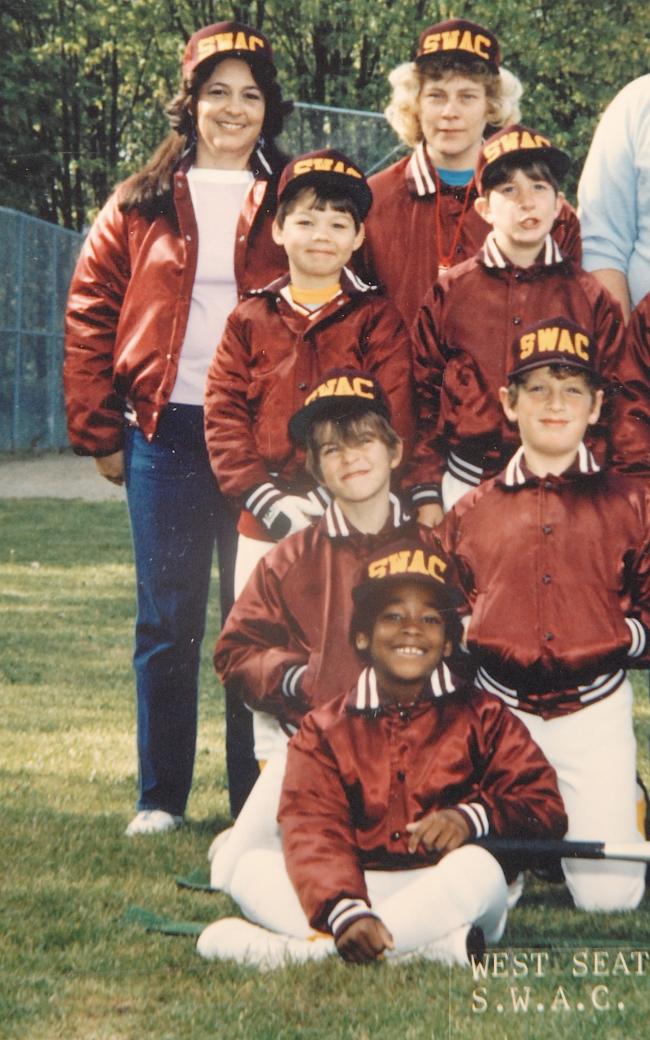Judy Ann Landin was White Center role model, icon
White Center icon Judy Ann Landin passed away April 12. She was a mother to three, and a mom to many more. According to her husband Edward, she prided herself on coaching integrated teams. She is pictured upper left, with her West Seattle Pee Wee baseball team in 1985.
Sat, 04/18/2009
On April 12, Edward Landin lost his wife, Judy Ann, 61, to emphysema. But what a life she had. As her family and friends tell it, she was more than just the mother to their three sons. She mothered thousands of White Center kids.
She volunteered for 20 years as chairman of the board of the Red Shield (Salvation Army) Junior Football League, which shifted to the Southwest Athletic Club, or SWAC. She became involved with the lives of nearly 200 kids a year, ages 7 to 14, on and off the playing field. That’s in addition to all the cheerleaders, and baseball and basketball team members.
“You met her, and five minutes later she was your friend,” said her husband, also 61, who grew up in Shorewood. She grew up in Scotts Bluff, Nebraska.
They met in 1965 while he was serving at the Naval Air Station Oceana in Virginia Beach and she lived nearby. They moved back to Shorewood. Edward, an electrician, took early retirement four years ago and they moved to Auburn. Edward said he is grateful to have had that time together with Judy.
“There wasn’t any ‘no’ in her heart,” he said. “Some kids came to (football) practice wearing new cleats and other gear. She’d see a kid coming to practice day after day in worn out tennis shoes. She’d take the opportunity to look a little closer, and buy him shoes if needed. Winning was the object, but not the purpose. The purpose was to give kids the opportunity to participate. That’s what it was all about. We were even handing out gear to kids on competing teams. Some just didn’t have the money to suit up their kids.”
Edward and Judy began operating bingo to raise money for SWAC, and then rented a bingo hall at 9837 17th Ave. S.W., near the round Washington Mutual Bank. That was in 1981, and it lasted 20 years until, according to Edward, crowds dwindled as people had more gambling options like large casinos and the lottery.
“It was a non-profit, and the proceeds went for SWAC related equipment, trophies, treats, lights, field rentals,” he said. “We eventually hired a crew when we stayed open day and night, three days a week.”
“SWAC’s idea was to give kids the chance to play, whether it was in White Center, Rainier, or wherever,” said Eddy Landin, 40, Edward and Judy’s oldest son, who played football in SWAC at age eight. “If a kid (in need) was out there, they could come and see mom down at the bingo hall for help. She didn’t make the kid feel 2 inches tall, or fill out a pile of paper work. That kid was able to play ball. End of story. That’s one of the proudest things I feel about my parents. They made it happen for a lot of kids that wouldn’t have had that shot.
“When mom saw a large, hard-working family with six or eight kids who were not having a great holiday season, she’d reach into her own pocket and help. She’d drop off a pile of groceries or toys, always keeping her eye out for other people," Eddy continued.
Eddy said of his two younger brothers that “Joey is the biggest and James is the loudest.”
“I was the daughter Judy never had,” said Laura Williams, who grew up a few doors down from the Landin’s and was close in age to the boys. “I worked for her in the bingo hall, and when my daughter Kierra was three, Judy took her to the store to pick out paint for the hall’s bathroom. They chose purple. Everyone remembers the ‘obnoxious purple bathroom.’ Judy was never too busy for me and I always had her ear. She helped counsel me through a problemed time with my husband, who I am still with.”
Edward admits, with a wry smile, that he and Judy were questioned by the IRS for a bit of cheating for charity.
He explained, “For many years we’d buy a bunch of bread and cold cuts to hand out to homeless people in Pioneer Square around Thanksgiving. We were technically violating the bi-laws, because all proceeds were to go to youth amateur athletics. But we did it anyway.”
The Landins also took in troubled kids.
Recalled Eddy, “I’d be playing with a kid in our backyard, and they were like, ‘Hey man, could I stay the night? Hey, could I stay tomorrow night, too? There were no strings attached, just a safe harbor. One kid lived with us for months when I was 12. He had a long struggle with substances. He came back last night to visit us because he heard about mom through the grapevine. He looked like he finely straightened out his life.”
Added dad, “They’d stay a week or a month or more. These kids were between 10-15 years old and were not at home anymore. They were runaways or whatever.
“Judy taught the kids who stayed with us that there was somebody they could talk to, and that they weren’t completely on their own. I think this came from her mom passing away when she was just seven. Judy was raised by aunts, and didn’t have mom or dad there. He was always on the road, working. I think she identified with these kids, and could see that even some of those staying at home were lost. There was a connection there.”


